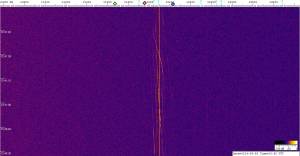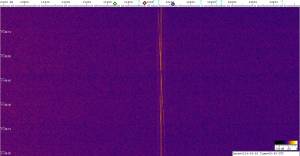Table of Contents

(remove this paragraph once the translation is finished)
Using VOR beacons for tracking flying objects
VOR radio bacons are a type of short-range radio navigation system for aircrafts, distributed evenly to cover most of the airspace.
By observing their signal, it was found out that the signal received on ground contains clearly distinguishable reflections from flying objects - see e.g. VOR beacon observation by station in Prague.
Coordinates and frequencies of all existing VOR beacons can be found at webside ourairports - check the navaids in map parameters.
Signal processing
VOR beacons work at carrier frequencies in range 108 - 118 HMz. Sampling of this 10 MHz wide band should make it possible to process all beacons at the same time. ADS-B data could be used to filter out know airplanes from the signal. Rest of the objects should be pick out as suspicious and should be further identified for example using a FDOA method.
Using VOR beacons to observe meteors has one advantage - these beacons work in a protected air band that is continuously monitored for interference. Therefore, the quality of obtained data is better than in other bands.
Hardware
To process and digitise signals, a new digitizing unit should be available. It would be advantageous to change an SDRX01B receiver for a newer version, dedicated to digitise signal in bandwidth approximately 10 MHz, in order to improve the parameters of the receiving chain.
Algorithms
Data from ADS-B
To obtain reference data and to filter airplanes, ADS-B data can be used.
dump1090
sudo apt-get install librtlsdr-dev git git clone https://github.com/MalcolmRobb/dump1090.git cd dump1090 make sudo rmmod dvb_usb_rtl28xxu
Now you can run the software e.g. with parameters to create a local web server:
./dump1090 --interactive --net


